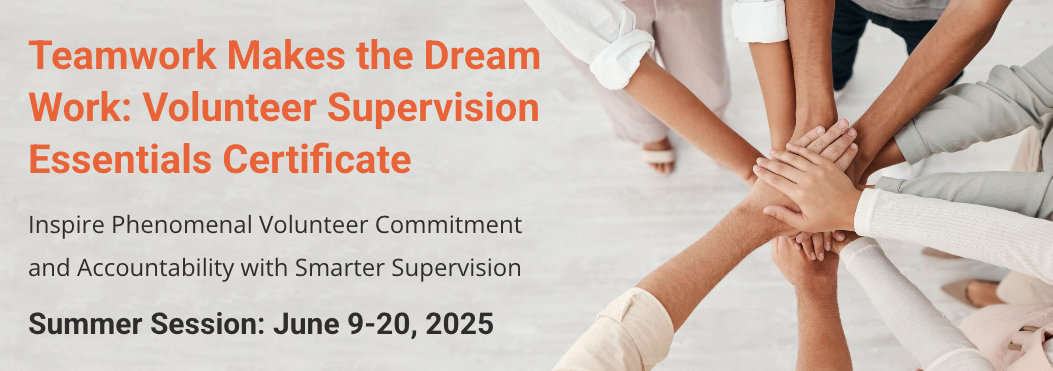Pro Roundup: Inspire Volunteer Involvement with 9 MUST Watch TED Talks
A large part of your role as a leader is to inspire volunteer involvement; that is, to motivate individuals to use their time and talent to help achieve collective action. But what do you do when you are not exactly feeling inspired yourself?
It can be easy to burnout in this profession. Your passion for service may have gotten you here, but pouring yourself into a worthy cause takes its toll.
The events of this year have not made this any easier. Inspired volunteer involvement is needed now more than ever, but the pandemic and social unrest have certainly made it difficult to gather in-person or organize.
We are all stretched beyond our limits. So, if you’ve felt a little unbalanced lately, that’s completely understandable. However, you’re going to eventually need to gain back that balance to continue your important work.
Finding Balance: Drawing Inspiration While Leading Involved Volunteers
When I think of balance, yoga comes to mind. When I’m able to devote time to regular practice, yoga can be a very grounding activity that allows me a chance to reflect on my purpose and my connection to others.
The concept of “drink as you pour” is popular with some yoga practices. This concept teaches you to draw inspiration from your work as you pour yourself into it.
Well, that’s all good in theory. But for true balance (and sanity), sometimes we need to draw that inspiration from outside of our work and invite some different perspectives so that we can continue to inspire volunteer involvement.
I’ve found that the quickest way to find a new perspective is with a quick TED Talk video!
TED Talks are very popular for a reason. They’re short (all under 18 minutes), singular presentations from well-vetted speakers designed to spark thought or action in the audience. Best of all, they’re completely free, accessible to anyone with an Internet connection, and you can watch them anywhere.
So, if you are searching for a little outside inspiration to get you through the remainder of this extraordinary year, we’ve gathered nine TED Talks to help.
You Are the Future of Philanthropy – Katherine Fulton
Katherine Fulton, President of Monitor Institute, gives an illuminating speech on innovations in giving and the future of philanthropy.
Fulton dives into the new, democratized formats of giving that includes the mass organization of the time and talent of volunteers, not just monetary gifts, to achieve bigger and bigger goals.
“Philanthropy is reorganizing itself before our very eyes,” Fulton says in the talk. “This is a moment in history when the average person has more power than at any other time.”
Fulton then discusses modern concepts like philanthropy-to-philanthropy giving, aggravated giving, mass collaboration, social investing, and innovated competitions.
Giving five examples, Fulton sites how crowd-driven, collective philanthropy could form a large part of the giving sector in the coming years. As issues like global warming, large catastrophes, pandemics, and poverty become more pressing and complex, it’s going to take more effort from more individuals to solve these difficult problems.
Fulton then explains how we’re developing a new vocabulary to define these new trends. With terms like ‘philanthrocapitalism’ and ‘philanthroentrepreneurs,’ Fulton calls for a new generation of philanthropists. What a great way to inspire volunteer involvement!
How Great Leaders Inspire Action – Simon Sinek
Why do you get up every morning? Why did you choose to lead volunteers? Why do you hope to inspire volunteer involvement in your community?
In the most viewed TED Talk ever, author Simon Sinek outlines a simple but moving model for inspirational leadership that starts with the question, “Why?”
This extremely popular talk explores how leaders inspire cooperation, trust, and change by acting purely on their passions and thus appealing to the core pathos of their followers. Sinek uses Apple, Martin Luther King Jr., and the Wright brothers as examples of how real purpose in leadership drives wild success and inspires real action.
If you’re looking to be more persuasive and lead people to take action, this is a must-watch TED Talk!
What it Takes to Be a Great Leader – Roselinde Torres
Where Sinek illustrates a simple model of leadership, it seems business consultant Roselinde Torres finds leadership a little more complicated.
Torres illustrates a wide gap in leadership preparedness, despite high effort and expense, blaming traditional but outdated training programs that only address how the world was rather than how it will be.
Instead, Torres argues that to become a great leader in the 21st Century, we need to constantly ask ourselves 3 questions:
1. Who are spending time with and on what topics? The answers are likely the trends you should anticipate.
2. How diverse is your network? Developing working relationships with people who are very different from you will help you achieve common goals.
3. How comfortable are you? Growth doesn’t happen until you have the courage to step out of your comfort zone!
“Great leaders dare to be different. They don’t just talk about risk-taking, they actually do it,” challenges Torres.
Torres then reminds us that resting in the predictability of yesterday will not prepare us for the realities of today, nor help solve the problems of the future.
We Need to Talk About an Injustice – Bryan Stevenson
In one of the best TED Talks I’ve seen, human rights attorney and Equal Justice Initiative founder Bryan Stevenson gives a powerful and personal talk on America’s justice system. In this Ted Talk, Stevenson speaks about the urgent need to talk and teach about our country’s history to overcome injustice.
“We cannot be full, evolved human beings until we care about human rights and basic dignity.”
Stevenson explains that America’s tendency to gloss over racism and discrimination in the justice system places the country’s identity at risk. Citing post-World War II Germany as an example, Stevenson says that only by speaking openly about these issues can we move past them.
We are reminded that society’s achievements in technology count for little when people continue to suffer persecution and discrimination. Ignoring America’s long history of violence against Black and brown people prevents “truth and reconciliation,” and stalls social progress.
Grit: The Power of Passion and Perseverance – Angela Duckworth
Angela Duckworth’s talk on grit, perseverance, and passion is my personal favorite on this list!
As Duckworth explains, “Grit” is passion and perseverance to achieve your long-term goals. Especially when progress toward that goal is difficult, halting, or slow.
“Grit is stamina. Grit is sticking with your future, day in, day out, not just for the week, not just for the month, but for years and working really hard to make that future a reality.”
Duckworth talks through the process of measuring IQ, talent, and circumstances in gaining success. Using seventh-grade math students as a case study, Duckworth finds that while both talent and luck matter somewhat, the intangible quality of passionate determination is usually the clearest predictor of long-term success.
What Nonprofits Can Learn from Coca-Cola – Melinda Gates
Melinda Gates has traveled much of the globe with the Gates’ foundation in a mission to eradicate Polio. If there’s one thing Gates knows for sure, it’s that Coca-Cola can be found pretty much anywhere.
Gates believes if Coke can be produced, marketed, delivered and sold in developing countries, then nonprofits could help make these nations’ lives better as well. Gates says nonprofits must learn from innovators and develop strategies like Coca-Cola’s to save lives and make the world a better place.
The Antidote to Apathy – Dave Meslin
This next video probably hits a topic you’re all too familiar with.
Community organizer and activist Dave Meslin challenges the wide held belief that “most people are too selfish, too stupid or too lazy” to try to make a difference in their community.
Instead, Meslin argues that people do care, but we live in a world that actively discourages getting involved. This is because engagement is constantly thwarted by obstacles and barriers, whether intentionally or unintended.
Some of these barriers include:
· Intentional systemic exclusion.
· Expensive public advertising… some important messages are unprofitable to say.
· Media’s subtle discouragement of engagement.
· Heroism… movies teach us that heroes are ‘chosen’ by prophecy. In truth leaders voluntarily step forward, form a collective team and work to achieve their goal.
· Political parties being so poll-driven they just tell us what we want to hear. This feeds cynicism and shows they cannot be trusted to be bold leaders.
Meslin concludes that “If we believe people are NOT too stupid, selfish or lazy to care, then we can fix each of these issues. We have to redefine apathy as a series of barriers, then identify and dismantle them.”
How to Motivate People to Do Good for Others – Erez Yoeli
Erez Yoeli opens his TED Talk by asking, “How can we get people to do more good, to go to the polls, give to charity, conserve resources, or even to do something as simple as washing their mugs at work so that the sink isn’t always full of dirty dishes?”
Yoeli goes on to outline 3 steps in motivating people to act with more altruism.
1. Increase Observability – Harness the power of reputations by making good deeds known.
2. Eliminate Excuses – If you can eliminate the excuses people give for not
3. Communicate Expectations- Give clear directions of the behavior you want.
The great thing about Yoeli’s suggestion on inspiring people to do more good is that they don’t require that you raise added funds or develop technologies.
How to Start a Movement – Derek Sivers
We saved the most fun TED Talk for last! This short and sweet talk by author and CD Baby founder Derek Sivers is a play-by-play commentary of a small movement happening in real-time.
Sivers begins the talk by playing a video of a shirtless guy dancing by himself at an outdoor music festival. A few seconds pass before the shirtless guy is joined by another person. This “first follower” is welcomed into the shirtless guy’s dance. Slowly, others join the dance until the frame is full of fellow dancers.
Sivers compares this mini-movement to larger social movements, giving us a surefire recipe for a successful movement in succinct terms. This 3-minute video is sure to have some takeaways about inspiring volunteer involvement.
Do You Have a Favorite Inspiring TED Talk?
If you have a TED Talk you’ve returned to time and again for inspiration or leadership guidance, tell us about it in the comments!
Ready to Inspire Volunteer Involvement on A Deeper Level?
Join Us in On the Inside!
Join our inspired group of professionals and get ready to tackle any obstacle ahead with courage and compassion.









